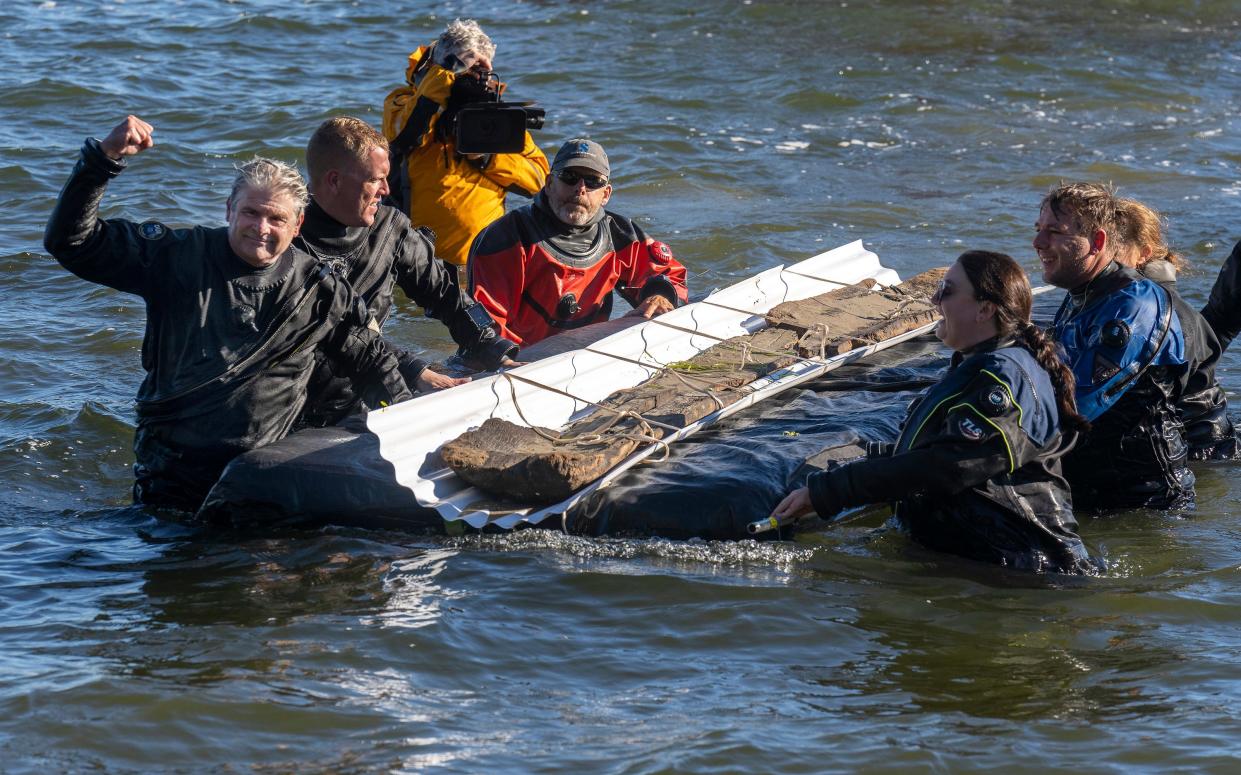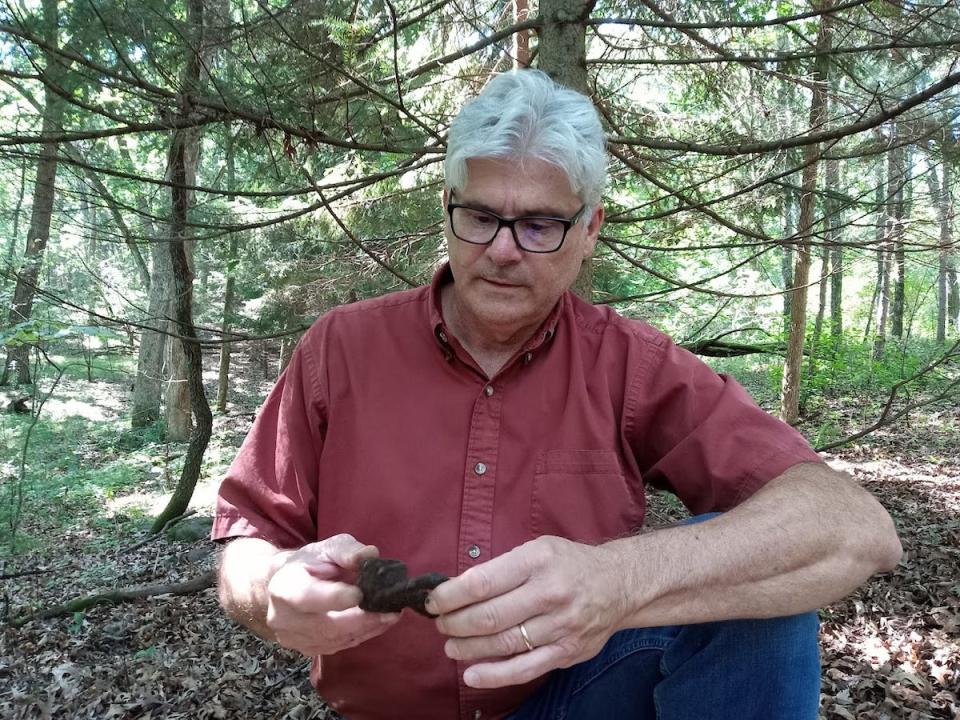Wisconsin state archaeologist James Skibo remembered for curiosity, enthusiasm after fatal diving accident

James Skibo, Wisconsin's state archaeologist and a well-known figure in the field, died recently in a scuba diving accident in Lake Mendota. He is being remembered for his curiosity and enthusiasm.
Skibo, 63, was recently the driving force behind the complex operations to pull two dugout canoes from Lake Mendota that were 1,200 and 3,000 years old.
He died April 14 while on a routine dive preparing for the maritime archaeology season, the Historical Society said.
He went missing and was found by another diver about 24 feet down, according to the Dane County Sheriff's Office. Sheriff's deputies brought Skibo to shore and performed CPR, but he died at the University of Wisconsin Hospital shortly thereafter.
What went wrong is under investigation, the sheriff's office said. Skibo was a certified diver and qualified for the depth of the dive, the Historical Society said.
Skibo left retirement to become Wisconsin's state archaeologist
Skibo, who grew up in the Upper Peninsula of Michigan, earned a doctorate at the University of Arizona and was a professor of anthropology and later department chair for 27 years at Illinois State University.
He retired in 2018 but came out of retirement three years later to become Wisconsin's state archaeologist. He oversaw the terrestrial and maritime archaeology teams and traveled the state teaching kids and adults.
Daina Penkiunas, the state historic preservation officer, said Skibo was a "big picture thinker" who was always looking for ways to the team to learn more — and to educate others about archaeology.
"He was full of enthusiasm for his work, and bringing people along," Penkiunas said. He had "lots of ideas on projects and things that we could be doing."
Skibo was a warm, cheerful presence in the office, "always there to say hello or make a little joke," Penkiunas said. His colleagues are feeling his absence.

Skibo was well-known for advances in studying pottery
An expert on the archaeology of the Great Lakes region, Skibo also pioneered a now-common method to study how pottery artifacts had been used.
From research at the University of Arizona and in the Philippines, Skibo developed a way to analyze the organic traces left behind in pots to determine what was once in them, known as pottery use-alteration analysis.
His dissertation on the subject was soon made into a book, "Pottery Function: A Use-Alteration Perspective" — which became a classic in the field, said his former professor, longtime collaborator and close friend, Michael Schiffer.
"If you want to know something about how to study how pottery was actually used, you go to Jim's book as a starting point," Schiffer said.
The experiments and theories Skibo and Schiffer published together at the University of Arizona are influential to this day, he said.
"Everybody knows his work," Schiffer said.
In a Facebook post, Schiffer wrote: "Archaeology has lost a giant in the field."
Skibo wrote and edited 11 books, including a 2006 memoir about his childhood in a remote mining village in the U.P.
In recent years, he'd been offering Schiffer feedback on his mystery novels. And if Schiffer would be feeling a little down, when he'd call Skibo to chat, "inside of a minute, he'd have me laughing."
"I loved the guy. He was just really, really special," Schiffer said. "Most professors probably never have a student like that in a lifetime of teaching."
Skibo loved archaeology, 'never worked a day in his life'
After retiring from his own professorship at Illinois State, Skibo and his wife, Becky, moved to the Langlade County village of White Lake.
For nearly three years, Skibo produced feature stories for Northwoods public radio station WXPR's "We Live Here" series. Among his many stories: profiles of an Ice Age Trail hiker, a water ski team and a funeral home director.
Penkiunas was grateful Skibo applied for the state archaeologist job in 2021.
"It was like, wow, here's this guy with all of these great credentials, and he wants to come work with us," she said. "He wanted to be back doing the things he liked doing."
Four months after he arrived, Skibo was helping carry a 1,200-year-old canoe out of Lake Mendota. He was instrumental in the operation to excavate the canoe and bring it to shore, and he even built the vat where it needs to rest in resin before it can be displayed in a museum.
Then, when a maritime archaeologist on staff found another canoe, this time 3,000 years old, Skibo dedicated himself again to the project. He worked closely with the Ho-Chunk Nation to involve them in the process.
Skibo learned to dive when he took the position so he could understand the work of the maritime archaeologists he supervised, Penkiunas said.
Because of the way the latest canoe was positioned when it was found, Skibo had said he believed more artifacts could be at the bottom of Lake Mendota, possibly from a flooded village, and he wanted to research it more.
"Jim loved his job and would say frequently that he had never worked a day in his life," his family said in his obituary.
The 'people's archaeologist'
Skibo called himself the "people's archaeologist" and was driven by a desire to "democratize" access to archaeology. In speaking to groups of students and adults and other educational ventures, he often spoke about the richness of the archaeological record and how much could be learned from it.
"What we're looking at today is just a fraction of history," he liked to remind people, Penkiunas said.
Skibo's expertise was combined with a natural ability to get along with people, Schiffer said.
After Skibo's death, Schiffer got a message from a former graduate student who'd met Skibo only a handful of times but recalled he'd always stop what he was doing to have a conversation with the student — who was effectively a stranger.
"He was so unpretentious and so humble, and he could establish a relationship with anybody at any time," Schiffer said. "That was his super power, I think."
Skibo is survived by his wife, Becky, and his adult children, Matthew and Sadie.
This article originally appeared on Milwaukee Journal Sentinel: Wisconsin state archaeologist James Skibo dies in diving accident

